A girl opens her phone after a stressful day, hoping to take a break from the negativity at school, but instead she finds countless tweets, TikToks and Instagram stories about Hailey Bieber vs. Selena Gomez and constant streams of hate aimed at both women. The concept of girl-on-girl hate has been normalized for too long, where women are often pitted and hypercritical of each other. More women need to be aware of how a patriarchal society impacts the girl-on-girl hate culture in order to aid the process of ending the unspoken resentment between women.
A lot of hate that women often project onto each other is caused by selfishness, jealousy and the need to compete. These feelings and actions directly relate to the patriarchy in America and the emphasis on unattainable beauty standards so often pushed onto women. According to the Reliable Plant, researchers believed the association between sex and reported required work effort is best interpreted as reflecting stricter performance standards imposed on women, even when women and men hold the same jobs.
Many times, women are not given the same opportunities as men, so they feel the need to be better than other women to be seen. Women have to tear eachother down because there are less opportunities for them to succeed. This causes women to feel jealous and eventually turn on each other due to competition, leading to hatred among people.
Additionally, low chances of success as well as the environment women are put in intensifies the need for competition. Giving women the same amount of opportunities as men can eliminate much of the underlying resentment women feel for each other and take steps toward an equal, positive future.
The media has always been a huge part of cancel culture and in turn, the fueling of hatred, especially against women. It has consistently been used to make women feel the need to compete and feel jealous of each other. For example, movies like “Mean Girls” center their plot on girl-on-girl hate to show how it truly affects young women. The movie illustrates how in a high school setting, girls tend to be cruel towards each other to feel better about themselves as a person.
The Pulitzer Center reported that social media can also undermine feminism as a movement through online harassment, constant self-comparisons and body image issues forced by societal beauty standards. Media platforms like TikTok and Instagram can feed into girl-on girl hate often using celebrities. The Bieber-Gomez drama reflects this concept, where many felt angry at Bieber for being rude to Gomez and sent death threats to Bieber.
Although some can argue that only one of those two women deserved the hate and was only jealous, this argument stems from one’s own feelings of jealousy. Women have been taught to turn against each other, especially when men are involved, and the media often highlights this. In situations like the one involving Bieber and Gomez, Justin Bieber received minimal criticism from the media even though he is the one who dated both of those women.
The media can seem limitless, yet the only way for one to control it is by ignoring the negative comments and drama that bleeds from it daily. The normalization of girl-on-girl hate will continue to evolve and harm upcoming generations.
Dr. Nancy O’Riley said strong female bonds among women can be life-changing and can collectively help women change the world. Women are truly the only people who can understand what another girl or woman is going through. If girl-on-girl hate is never resolved, the newer generations will only get worse.
The best way to end the normalization of women hating each other is for everyone to find comfort within themself and be content with their identity. This can include avoiding actions that hate on other women out of jealousy.
According to Psychology Today, when one is disconnected from themselves and their own emotions and needs, they can become narcissistic and unaware of their impact on others. Accepting oneself and not feeling the need to be in constant competition with women around them will put an end to girl-on-girl hate. Increasing positivity online, supporting affirming videos toward women or having empathy for those being bullied online can help decrease hate.
One must remember that just because someone may also be beautiful, smart and talented, this does not take away from one’s own good qualities. Remembering this will be the biggest stepping stone toward ending the girl-on-girl issue in the current generation, the media and the future.


